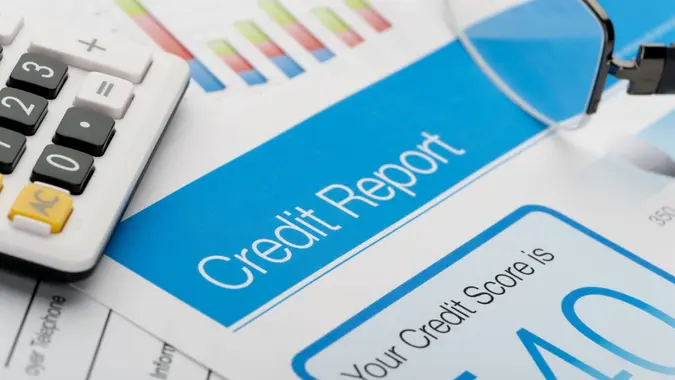7 Ways To Boost Your Credit Score This Month

Commitment to Our Readers
GOBankingRates' editorial team is committed to bringing you unbiased reviews and information. We use data-driven methodologies to evaluate financial products and services - our reviews and ratings are not influenced by advertisers. You can read more about our editorial guidelines and our products and services review methodology.

20 Years
Helping You Live Richer

Reviewed
by Experts

Trusted by
Millions of Readers
Your credit score often decides whether you qualify for a credit card or a loan, and it determines your interest rates. Credit scores range from 300 to 850, and lenders use this number to assess credit risk. So the higher your credit score, the easier it is to qualify for financing.
But a low credit score doesn’t have to define your creditworthiness forever, or stop you from getting the credit you need. It can take several months or longer to go from bad credit to good credit, but there are strategies to quickly raise credit scores in as little as a month. Here’s how to raise your credit score fast.
1. Pay All Your Overdue Bills
Whatever overdue bills you have, pay them ASAP this month to avoid having late payments on your credit report, which can remain for up to seven years. Even if you’re late paying a credit card bill and get hit with a late fee, you can avoid credit damage by submitting a payment before you’re 30 days late. A creditor can’t report late payments to the credit bureaus until your account is 30 days past due.
Your payment history makes up 35% of your credit score, so you can increase your credit score by making on-time payments. If mailing a payment might make it late, make a payment over the phone or a same-day payment online.
2. Pay All Your Current Bills for the Month
Pay all your current bills for the month on time — and don’t miss anymore payments, said Whitney Lee, a financial solution engineer at Salesforce. “Even one missed payment will create a blemish on your credit report and harm your score, so fix that now.”
Create alerts or reminders set for a few days before a payment is due, or make payments as soon as you receive your new monthly statement. You can also avoid missed payments by scheduling recurring automatic payments from a checking or savings account. Putting your finances on autopilot is convenient and helps prevent late fees — just make sure you have enough money in your bank account.
3. Use the Power of Negotiating
Never underestimate the power of negotiating, especially if you were a good customer before, said Yahya Mokhtarzada, founder and CEO of TrueBill, which helps track and manage subscription services and recurring bills. Depending why a payment’s late, one phone call can potentially wipe your slate clean.
“If your bills pile up after a period of nonpayment and are now a black mark on your credit, you can ask [creditors] to remove late payments from your credit report, or at least mark the account paid as agreed once you pay the remaining balance,” Mokhtarzada said. If your creditor agrees to remove a blemish from your credit report, make sure you get this agreement in writing this month.
4. Become an Authorized User
You can also improve your credit score by becoming an authorized user on a relative or close friend’s credit card. The primary account holder has to add your name as an authorized user so you can receive a credit card in your name. “This is the easiest and safest way to quickly build credit,” said Roman Shteyn, CEO of RewardExpert, a free service that helps people maximize spending to earn discounted travel.
This credit account will appear on your credit report almost immediately; you’ll inherit the primary account holder’s positive credit history. But make sure the person you choose manages credit responsibly: How the primary account holder manages the account has a direct impact on your credit score. If he keeps a high balance or doesn’t make on-time payments, your credit score will suffer.
5. Pay Off Balances Every Month
Carrying a balance is not the way to build credit. “Making a purchase and paying off the full balance every month also builds credit, and is more favorably looked at than carrying a balance,” Lee said.
Eliminate existing balances this and every month to increase your credit score — because the amount you owe makes up 30% of that number. Additionally, your credit utilization ratio — your credit card balance compared to your credit limit — is a key component of your personal score. To increase your score in a month, reduce this ratio.
If you can’t completely pay off credit card balances, pay them down so you don’t owe more than 30% of your credit limit. Use your personal savings to reduce balances and pay more than your minimums; ideally, you should only spend what you can afford and pay off your credit cards every month.
6. Ask For a Credit Card Limit Increase
You can improve your credit utilization ratio — and thus, your credit score — by asking your credit card company for a credit line increase. If you have a $2,000 credit limit and a $1,000 balance, your credit utilization ration is 50% — which hurts your credit score. But if you can increase your limit to $3,500, your utilization ratio goes down to 28%, giving your credit score a fast boost. “All this typically takes is a phone call to your credit card issuer with a request to boost your credit limit,” said Shteyn.
Although a credit limit increase helps your credit, you should only request one if you have self-control. Shteyn warned that spending the maximum amount of your new credit limit defeats the purpose of keeping your ratio low. “Don’t use your newfound increase on purchases; just let the new credit increase do its work for you on your credit score,” Lee said.
7. Dispute Errors on Your Credit Report
Creditors sometimes make mistakes — such as reporting a higher credit card balance or a late payment in error — so frequent credit monitoring can’t be overemphasized. Inaccuracies can lower your score, so check your credit score and report regularly to discover fraudulent activity and errors early.
“If you find discrepancies, you can dispute the error yourself or hire a credit repair firm that can remove numerous errors within one month,” said Lori Askins, president of Branded by LA. “By removing negative inquiries, you can boost your credit score by 100 points or more.”
Some people don’t think about credit until they’re applying for a loan or a credit card. But that’s the worst time to learn about a low credit score. A low score can be frustrating and hindering, but it’s fixable. In just a few steps, you can improve your rating and add points to your score within a month.
More From GOBankingRates
 Written by
Written by  Edited by
Edited by 
























